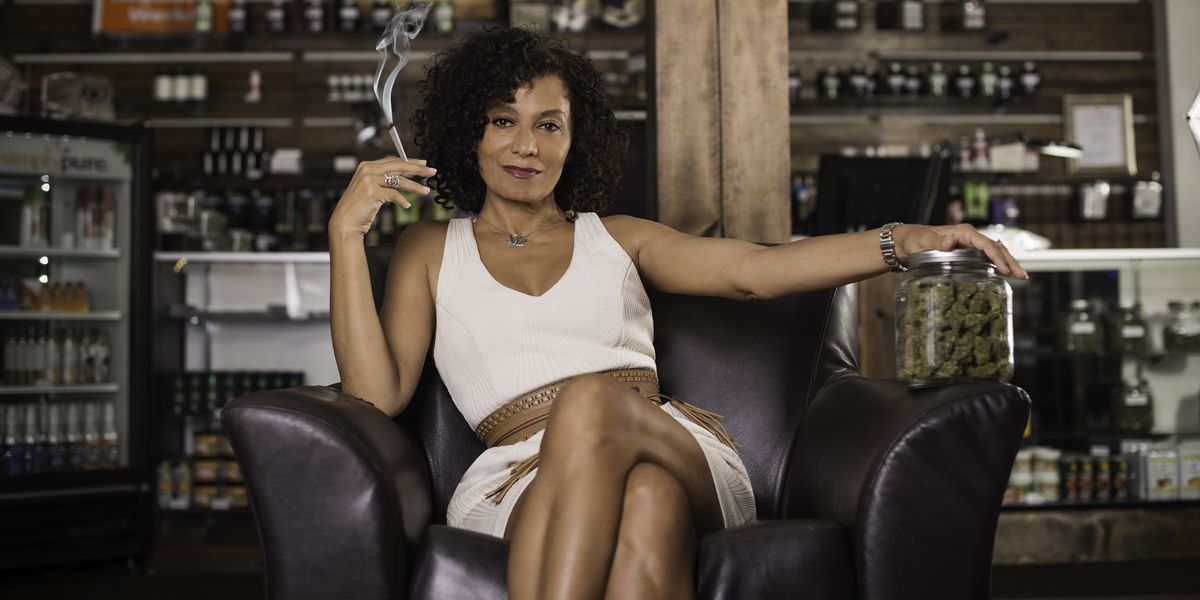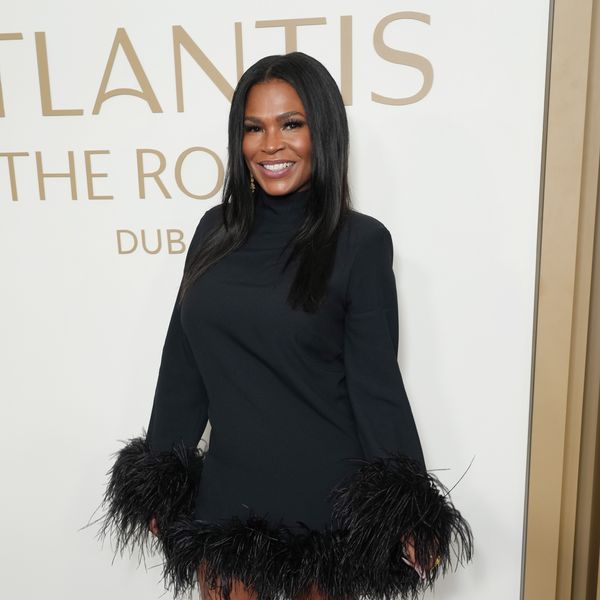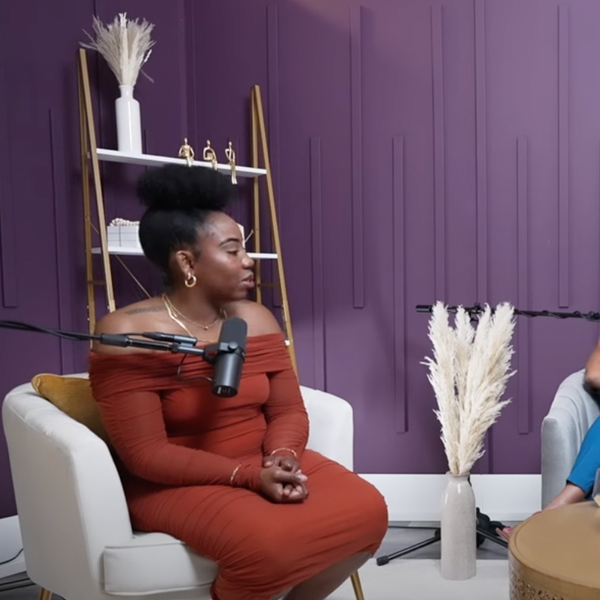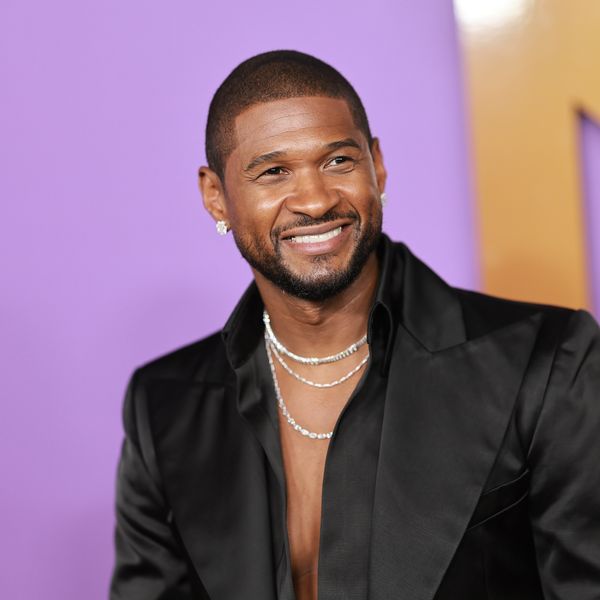
CEO Cannabis Connoisseur Wanda James Reveals How She Planted The First Seeds Of Success
In The Smoking Gun, we talk to CEO cannabis connoisseurs about how they planted the very first seeds of success in their careers, how they balance their day-to-day life, and how they are using their work to make the marijuana market more inclusive to people of color.
Society tells us there are two types of people in this world: polished professionals who are CEOs of wildly successful businesses and people who like to get high AF. But Simply Pure CEO Wanda James is living proof that you, too, can be a woman who does both, sis.

As a veteran, former member of President Obama's Finance Committee, previous campaign manager for congressman-turned-Colorado Governor, Jared Polis, and full-time business owner, there's no doubt that Colorado dispensary owner Wanda James has a lot on her plate. But this trailblazer is on a mission to ensure that every single person in our community has the opportunity to eat. After her brother was indicted and incarcerated for a minor weed offense at only 18 years old, Wanda discovered a discrepancy in the system that was obviously disproportionate to people of color and decided to become the agent of change that she wanted to see in the cannabis industry.
In 2009, Wanda and her husband, restaurateur Scott Durrah, became the first Black dispensary owners in Colorado, and since have used their platform to advocate for the abolition of mass incarceration and create opportunities for people of color in the cannabis industry. Wanda told xoNecole exclusively, "Along the way, we found out that cannabis is indeed, truly medicinal. That we can save people; we could help vets with PTSD...we found out that we can help babies with epilepsy and grownups with MS. So all of a sudden we've gone from a recreational plant that the side effects make you giggle and eat cheesecake, and we found that this amazing plant also heals your body."
I had a chance to sit down, roll up, and blaze one with this trailblazer, who spilled all the tea on how she got started, her love of the plant, and what she's doing to change the landscape for people of color in the cannabis industry. Here's what I learned:
What is your first memory of being introduced to cannabis?
I was 16, and I was hanging out with a really good friend of mine. He was giving me a ride home and he pulled out a joint and he's like, "You ready to try this yet?" And I was like, "You know what? Alright, I'll try it."
At first, I was scared because I was expecting to be stoned, [like] walls were gonna move and I was going to see pink elephants and my mind was going to be blown, and I was going to be stoned. And what I found was I was delightfully elevated. My thoughts became more focused because there were so many different things that I was thinking and feeling and I enjoyed it.
What does your day to day look like?
I want to be fair. I want people to know that I work my ass off and I need young people and I need women to know that, y'all, what everybody thinks they see, it's like the iceberg, right? That's 20% of what I do. The 80% of what I do is that underside of the iceberg. I am up every single day at 4:30 AM, Saturday and Sunday included. I don't sleep in; I can't sleep in. The minute I get up, I turn on my computer. I answer all of my emails from the last 10 hours or so. During that time, it's quiet. I can think and I can get my thoughts out. So I return all my emails. I then do all of my accounting. I take a shower and I'm in the office by 9:30, 10:00 every day.
I usually leave the office at about 5:30 or 6:00 every night, or maybe a little earlier and maybe Kali, my assistant, and I will go and end the day and smoke a joint and she'll go off and do her things. I'll get home here at about 6:30 or so. Scott and I will have dinner together. Maybe catch a few movies or whatever else. And then I'm usually in bed at about 11:00, 11:30 every day.
Has working in the cannabis industry always been a goal for you?
No, and it's funny because you're the second young person that's asked me, has this always been a goal? You have to remember, up until 2009 [when] I was 44 years old, the goal of selling weed would have made me a drug dealer, not an entrepreneur. See the difference?

Photo by Joe Mahoney
"Up until 2009 [when] I was 44 years old, the goal of selling weed would have made me a drug dealer, not an entrepreneur. See the difference?"
Yes! There is definitely a difference!
And this is what's really inspiring, you may not even know what your career is yet because your career may not have even been invented yet. I did not know until 2009 that the possibility of this being a business would even be a thing. I wasn't really sure what it was going to be, but I didn't think it was going to be that.
What inspired you to join the market in the first place?
Because of my 25 years with three senators on speed dial, with a governor on speed dial, with Congress on speed dial, we felt relatively confident that we were going to be able to enter this industry without the fear of going to jail, which was the point of entering the industry. Because up until then, Black people had been going to jail. When we started in 2009, the goal was social justice. $260 worth of the street value of bad cannabis cost my brother 10 years of his life. He never saw an attorney, which, when he told me that I didn't understand until I saw When They See Us.
He [later] tested positive on his piss test and they immediately put an 18-year-old in a privatized prison, where for the next four and a half years, my brother picked cotton every day. He had to pick a hundred pounds of cotton a day in Texas to purchase his freedom. My brother became a slave. A whole bunch of people's brothers became a slave because that became an American-Corporate balance. My brother picked a hundred pounds of cotton every day for four years. How much does the cotton industry owe my family?
For almost seven years, we were the only ones in Colorado and that's a shame. And this is the racism that we've got to be able to fight. I've often said that my father's generation fought to be able to ride the bus, right? To get on the bus and sit where they wanted to on the bus. Our challenge is how do we own the bus? How do we own the bus line, right? So, it's one thing to decriminalize, which is great. We should not be going to jail for this. But now let's take it a step further.
What has your extensive professional career working with Presidents and Fortune 500 Companies taught you about the work you’re doing now?
Ironically, everything that I have done in my life up until this point has prepared me for this point. When you're going through your life and like, "Why am I here? Why am I doing this?" When I look back on it, everything that I have done has trained me for this.
After 25 years in politics, I know how to talk to US senators. I know how to talk to governors. Hell, I know how to talk to presidents, right? So everything that I have done in my life has prepared me for this one moment in time. Even my love of the plant, you know? I'm not just the business owner, I'm a client.

Courtesy of Wanda James
"After 25 years in politics, I know how to talk to US senators. I know how to talk to governors. Hell, I know how to talk to presidents, right? So everything that I have done in my life has prepared me for this one moment in time. Even my love of the plant, you know? I'm not just the business owner, I'm a client."
I love that! And I saw in a previous interview you said that at your house, there’s weed in the wine, food, and beer and I’ve never aligned with someone so closely in my life. In your own words, what are your views on medical and recreational cannabis usage?
The only time that I didn't smoke was the five years that I was in the military because the penalty was too high for a military officer in the late 80s, early 90s. If you were caught with illegal drugs, you went directly to jail, period. No conversation, no nothing. You just went to jail. So I wasn't going to chance that.
If you go to The Officer's Club, you could get top-shelf alcohol for 75 cents a drink. If you could drink all night and get up in the morning and put on your uniform, you were doing it right. And during that time of my life, I mean that was probably the time that I felt the least like myself. I was in my twenties, so hangovers don't last long and you're able to deal with your day, but [you're] nowhere near as sharp as you could be, nowhere near as engaged as you could be and it was because of alcohol. So it's been interesting to me when I look at alcohol versus cannabis. Alcohol loses all the time in my book.
What is the biggest misconception you think people have about marijuana products?
I think that the biggest misconception about cannabis is that people want to put it in the drug column. For me, when I think of drugs, I think of something that your body doesn't necessarily want or doesn't want, may need but doesn't want. I think that cannabis is something that works with our bodies. It works in total alignment with our bodies.
I just don't see this as a negative at all. I run three businesses, I'm up at 4:30 every morning, my husband and I are in great shape; we run, we do all kinds of athletic things. Neither one of us have any "ailments" to speak of; we don't have high blood pressure, we don't have diabetes and I'm not saying that's because of cannabis, but I'm also not saying it's not because of cannabis.
What advice do you have for women like me who want to enter the cannabis industry but may be intimidated by the barriers to entry?
Don't be intimidated, first and foremost. Take the word "intimidated" out of your vocabulary. And let me say, we all feel nervous sometimes. We all feel anxiety sometimes. Every time I go into a meeting, I feel nervous. I get that weird feeling in my stomach. I'm like, "Oh, here we go." But you know what though? That's life. That's not a negative feeling. That's a positive feeling. That's your adrenaline getting going. Adrenaline is getting released in your body so that your brain gets sharp.
We need to learn to love that feeling because that's the feeling of excitement and things happening. Yes, it's scary. Absolutely. It's scary because you know what? It might not work, but so what? So what? Because it might work.
"Every time I go into a meeting, I feel nervous. I get that weird feeling in my stomach. I'm like, "Oh, here we go." But you know what though? That's life. That's not a negative feeling. That's a positive feeling. That's your adrenaline getting going. Adrenaline is getting released in your body so that your brain gets sharp."
What footprint do you plan to leave on the cannabis industry when you retire?
I want this industry to be the catalyst for ending slave labor in America. Because when we talk about mass incarceration, we are talking about [in cannabis-related arrests alone], 800,000 people a year arrested for simple possession before legalization started. A year. Not 800,000 people total; a year. So I want this industry to be equitable. I want it to shine a light on what racism has done to destroy the black and brown community.
And then I want to see cannabis be the means of fixing that issue. Okay. In other words, I want to see our families and our communities benefit long-term from cannabis in the exact same way that Kennedys benefited from Irish whiskey when it was illegal. I want to see America pay its debt. And it is a debt and they do owe us, and I think that cannabis, that this industry can be the vehicle in order to make that happen.
Make sure to stop by Simply Pure the next time you're in Colorado and keep up with Wanda's adventures on Instagram @WandaLJames!
*Some responses have been edited and condensed for clarity.
Featured image courtesy of Wanda James.
- Wanda James Is The First African American Dispensary Owner ... ›
- The Rise of a Colorado Cannabis Entrepreneur: Wanda James ... ›
- A Cannabis Pioneer's 'Lonely' Place in the Industry | The Takeaway ... ›
- Best Cannabis Dispensary | Meet Simply Pure's Leadership Team ›
- Wanda James - CEO - Simply Pure Dispensary | LinkedIn ›
- Welcome to Simply Pure Cannabis Dispensary and CBD Brand ›
- This Weed Warrior Is Breaking Barriers In The Marijuana Movement ›
- Wanda L. James (@WandaLJames) | Twitter ›
- Wanda James - Wikipedia ›
- Dispensary Owner and Marijuana Activist Wanda James Talks ... ›
Taylor "Pretty" Honore is a spiritually centered and equally provocative rapper from Baton Rouge, Louisiana with a love for people and storytelling. You can probably find me planting herbs in your local community garden, blasting "Back That Thang Up" from my mini speaker. Let's get to know each other: @prettyhonore.
How This New Bond Repair Line Transformed One Mother's Postpartum Shedding Into The Ultimate Curl Comeback
This article is in partnership with SheaMoisture
For Crystal Obasanya, her wash day woes came shortly after her son did. The beauty and lifestyle content creator had been natural for years, but during postpartum, she quickly learned about one reality many mothers can relate to experiencing: postpartum hair loss. “Sis had thinning hair. Sis had split ends,” she shared about her hair changes in a Reel via xoNecole.
Over a year into her postpartum journey, Crystal explained she also had dry, brittle hair, noting that keeping it hydrated before pregnancy had already been “a task.” The 4C natural recalled going from thick hair during pregnancy to a thin hairline due to postpartum shedding as “devastating.” When it came to strengthening and revitalizing her hair, the new SheaMoisture Bond Repair Collection was just the thing she needed to elevate her damaged coils to revive and thrive status and get them poppin' again.
SheaMoisture is providing us with the cheat code for transforming dry and damaged strands into thriving and deeply nourished crowns. By unveiling their 4-step hair system, the SheaMoisture Bond Repair Collection is equipping you with the tools to reverse signs of hair damage caused by protective styling, heat, and color and is uniquely formulated for Type 3 and 4 hair textures.
The haircare system revives damaged natural hair by repairing and rebuilding broken hair bonds through a game-changing combination of HydroPlex Technology and AminoBlend Complex, a unique blend of fortifying amino acids formulated specifically for curly and coily hair. Scientifically proven to reduce breakage by 84% and make your hair six times stronger (vs. non-conditioning shampoo), the collection infuses your hair with the nourishment it craves and the strength it deserves.
All five products of the SheaMoisture Bond Collection are infused with natural strengthening ingredients like Amla Oil and fair-trade shea butter. The collection consists of the 4-step breakage-fighting Bond Repair system, as well as the Bonding Oil.
“When trying it out, I quickly noticed that my hair felt revived and renewed, and my curls were so hydrated,” Crystal said while using the Amla-infused Bond Repair Leave-In Conditioner. “I also felt my hair strands were stronger.” So much so that the influencer felt brave enough to get her hair braided shortly thereafter. “I can definitely say that I will be keeping it in my hair wash routine,” she added in the caption of her Reel about her positive experience using the products.
SheaMoisture Bond Repair Collection is making bond-building a key player in your wash day routines and the purveyor of life for thirsty manes. Because who doesn't want stronger, shinier, happier hair?
Step One: Bond Repair Collection Shampoo
Rejuvenate your hair with SheaMoisture Bond Repair Shampoo, your go-to solution for luscious locks. Packed with hella hydration power, this shampoo adds moisture by 60% while removing buildup without stripping your strands. This shampoo gently cleanses impurities while significantly enhancing shine, smoothness, and softness.
The Bond Repair Collection Shampoo is the first step in the 4-step Bond Repair system, all of which are powered by the uniquely formulated AminoBlend, and HydroPlex, SheaMoisture’s technology that rebuilds hair strength at its core.
Step Two: Bond Repair Collection Conditioner
Tailored to repair styling damage, this creamy conditioner locks in 12x more moisture than standard non-conditioning shampoos, boosting damaged hair strength by 1.5x with significantly less breakage. The creamy SheaMoisture Bond Repair Collection Conditioner deeply hydrates, enhances manageability, and leaves your hair looking healthier and shinier.
Step Three: Bond Repair Collection Masque
This Ultra Moisturizing reparative masque is a moisture-rich game-changer for those dealing with the aftermath of hair damage caused by styling. The SheaMoisture Bond Repair Collection Masque delivers 13 times more moisture compared to non-conditioning shampoos, ensuring your hair feels nourished and soft. Designed to repair and rejuvenate, this masque significantly strengthens damaged hair — making it twice as strong while reducing breakage.
Step Four: Bond Repair Collection Leave-In Conditioner
Elevate your curl game with SheaMoisture’s Bond Repair Collection Leave-In Conditioner. Lightweight and hydrating, the Bond Repair Leave-In Conditioner provides 12x more moisture than non-conditioning shampoos and tames frizz with 24-hour humidity control. Designed to define curls and coils, the leave-in conditioner enhances softness and shine allowing you to detangle effortlessly.
Bonding Oil
The SheaMoisture Bond Repair Collection Bonding Oil is a multitasking all-in-one formula that acts as a heat protectant and provides the hair with moisture, strength, shine, damage protection, and intense nourishment. This lightweight oil not only offers 24-hour frizz and humidity control but also fortifies your tresses, making them up to 5 times stronger with significantly less breakage.
Featured image courtesy
Tailor-Made Tracee: How To Improve Your Everyday Style Like An Icon In The Making
A style icon before it was thrown around mercilessly, a society IT girl well before Gossip Girl made it famous, and arguably one of the funniest women on the small and large screen. A woman with the unparalleled fashion appeal of Capote’s famed Swans and the fierceness of a socialite beyond fashion like Bianca Jagger (a family friend, of course). Yet, her lexicon of looks remains modern and fresh, a nod to the way fashion was consumed during her emerging years.
The icon started young as a model for houses like Mugler, in a time when fashion was deeply personal and intentional. Fashion of the 80s and 90s was built on core components of structure, lines, and silhouette. Tracee Ellis Ross experienced all of this firsthand in her formative years, and it showed in her style. It’s one of the many ways she maintains a level of relatability, especially in a saturated sea of superficial styles. The way Tracee charges everything in her life, especially fashion, with a breath of her spirit is remarkable, courageous, and inspiring. (So much so that Roku decided to build an entire television show around Tracee being Tracee, which is set to air in 2025).
Even though she shares a stylist with fellow uber-celebrity like Hailey Beiber, that doesn’t overshadow her taste and aesthetic. The purveyor of fashion exposition, Tracee has stylized her wardrobe much like her life: intentional, fun, and rooted in her. Despite the need for Gen Z to create brand aesthetics behind every look, Tracee’s street style cannot be boxed in or labeled. It borrows from each genre and era, meticulously put together with the threads of a tried and true style purveyor.

TheStewartofNY/GC Images
Be Intentional
If nothing else, Tracee has a clear intention behind every look, even the most casual-seeming. Behind each incredible vintage accessory and rare sneaker, there is a level of Tracee in it. A story, a feeling, an aspect of the design that speaks to Tracee’s personality. That very intention makes her style so relatable, especially in today’s society, where one of the most valuable forms of currency is relatability. A celebrity rarely possesses that, much less the child of an A-list celebrity.

Gotham/GC Images
Make It Enjoyable
No matter what you do, always make it enjoyable. The founding concept of personal style is just that: style that inspires you. There’s an internal happiness that glows from within Tracee, and it is easily translated into her wardrobe. Each trend she incorporates or emerging designer that she wears is a nod to her enjoyment of fashion. Her style feels as though it’s not taken too seriously, with sacrificing the cohesiveness. There’s a story being told, whether that’s playful or businesswoman or beach babe. Her style feels good to watch, a very rare thing nowadays.
You Are The Best Accessory
At the end of the day, an outfit is entirely dependent on the wearer. No price point, TikTok trend, or Vogue stamp of approval can overshadow personal taste. This is something Traceee understands deeply, and the primary reason for her fashion transcendence over the years. Even her most casual of street looks put glossy editorials to shame. She has a keen self-awareness of her style and what she feels good in, that no matter what, she will also be her best accessory.
Let’s make things inbox official! Sign up for the xoNecole newsletter for love, wellness, career, and exclusive content delivered straight to your inbox.
Featured image by Stephane Cardinale - Corbis/Corbis via Getty Images









